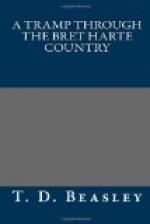What is of far greater consequence, the man on the road comes into touch not only with Nature, but the Children of Nature! In these days, automobiles are as thick as summer flies; you cannot escape them even in the Sierra foot-hills. No attention is paid them by the country people, unless they are in trouble or have caused trouble, which is mostly the case. But the man who “hikes” for pleasure is a source of perennial interest not unmixed with admiration, especially when walking with the thermometer indicating three figures in the shade. To him the small boy opens his heart; the “hobo” passes the time of day with a merry jest thrown in; the good housewife brings a glass of cold water or milk, adding womanlike, a little motherly advice; the passing teamster, or even stage-driver — that autocrat of the “ribbons” — shouts a cheery “How many miles today, Captain?” or, “Where did yon start from this morning, Colonel?” — these titles perhaps due to the battered old coat of khaki.
All the humors of the road are yours. In fact, you yourself contribute to them, by your unexpected appearance on the scene and the novelty of your “make-up,” if I may be pardoned the expression. At the hotel bar, you drink a glass of beer with the local celebrity and thus come into immediate touch with, the oldest inhabitant.” After dinner, seated on a bench on the sidewalk, you smoke a pipe and discuss the affairs of the nation or of the town — usually the latter — with the man who in the morning offered to give you a lift and never will understand why you declined. Invariably you receive courteous replies and in kindly interest are met more than half way.
The early romances, the prototypes of the modern novel, from “Don Quixote” to “Tom Jones” and “Joseph Andrews,” were little more than narratives of adventures on the road. “Joseph Andrews” in particular — perhaps Fielding’s masterpiece — is simply the story of a journey from London to a place in the country some hundred and fifty miles distant. In these books all the adventures are associated with inns and the various characters, thrown together by chance, there assembled. Dickens unquestionably derived inspiration from Smollett and Fielding; nor is there any doubt but that Harte made a close study of Dickens.
From which preamble we come to the statement; if you would study human nature on the road, you must simply go where men congregate and exchange ideas. The plots of nearly all Bret Harte’s mining stories are thus closely associated with the bar-rooms and taverns of the mining towns of his day. What would remain of any of Phillpott’s charming stories of rural England, if you eliminated the bar-room of the village inn? In hospitality and generous living, the inns of the mining towns still keep up the old traditions. The card room and bar-room are places where men meet; to altogether avoid them from any pharisaical assumption of moral superiority is to lose the chance of coming in contact with the leading citizen, philanthropist, or eccentric character.




